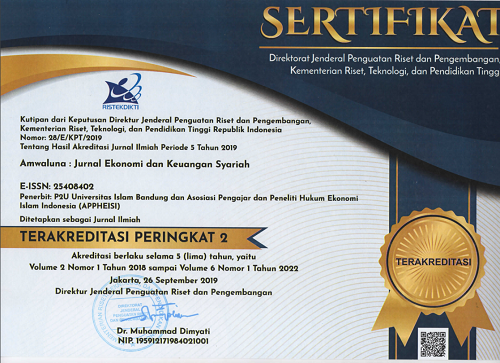Red Ocean Strategy: Quadran Strategy in Building Bandung City Mosque Cooperative
Abstract
The purpose of this study is how to optimize the problem solving of the Mosque Cooperative in Bandung City through the transformation of generic strategies and social innovation catalysts with the Red Ocean Management Strategy approach. Two steps have been taken, namely the identification of SWOT and the selection of generic strategies and social innovation catalysts through the Red Ocean Management Strategy approach. The results of the IFE and EFE SWOT analysis and are stated in the quadrant matrix identified in quadrant III, namely the mosque cooperative in a weak and threatened condition, where this condition is unfavorable for the mosque cooperative, which is dominated by the organization's internal weaknesses and threatened by the external environment. The Red Ocean strategy that must be carried out by mosque cooperative managers is focus and product differentiation by catalyzing innovation in the service process with priority on improving internal management.
Keywords
Full Text:
PDFReferences
Abdolshah, M., Moghimi, M., & Khatibi, S. A. (2018). Investigating competitive advantage in banking industry based on Porter's Generic strategies: IRANs newly-established private banks. International Journal of Applied Management Sciences and Engineering (IJAMSE), 5(1), 52-62.
Bingol, D., FİLİZÖZ, B., Koparan, E., Okan, T., & Capkulac, O. (2017). The Effect of The Strategic Management Tools On Smes'firm Performance.
Badan Pusat Statistik , 2020. Kota Bandung dalam Angka. Bandung: BPS
Cholil, M. (2016). Revitalization of mosque role and function through development of "Posdaya" in the view of structuration theory. Research on Humanities and Social Sciences, 6 (12), 43-51
Chusmeru, C. (2019). Revitalisasi Dan Model Pengkaderan Dalam Pengembangan Koperasi Pesantren. Prosiding, 8(1).
Gemari. (2007). Minister of Religion Canagged Mosque-based Posdaya in Pemalang. Edition 74, Year VIII. March 2007.58-59.
Guaipatín, C., Guaipatín, C., Guaipatín, C., & Guaipatín, C. (2013). Cómo promover innovaciones de alto impacto a través de fondos de innovación social: Las oportunidades de la cooperación público-privada
Hasyim, SL (2016). Mosque Strategy in Empowering the Economy of the Ummah. JURNAL LENTERA: Religious Studies, Scientific and Technology, 15 (2), 189-200.
Kim, W. C., & Mauborgne, R. (2005). Value innovation: a leap into the blue ocean. Journal of business strategy.
Krlev, G., & Lund, A. B. (2020). Social innovation ignored: framing nonprofit activities in European news media. Voluntas: International Journal of Voluntary and Nonprofit Organizations, 31(5), 949-965.
Mardikanto, T. and Soebiato, P. 2013. Community Empowerment in Public Policy Perspective. Bandung: Alfabeta.
Marlina, R., & Pratama, Y. Y. (2017). Koperasi Syariah Sebagai Solusi Penerapan Akad Syrikah Yang Sah. Amwaluna: Jurnal Ekonomi dan Keuangan Syariah, 1(2), 263-275.
Muslim, A., Karsidi, R., Wijaya, M., & Joebagio, H. (2014).A Mosque-Based Economic Empowerment Model for Urban Poor Community. International Journal of Social Science Research, 2 (2), 80-93.
Milshina, Y., & Vishnevskiy, K. (2019). Roadmapping in fast changing environments–the case of the Russian media industry. Journal of Engineering and Technology Management, 52, 32-47
Matthyssens, P., & Vandenbempt, K. (2010). Service addition as business market strategy: identification of transition trajectories. Journal of service management.
Nguyen, H., Tran, T. H. M., Nguyen, T. H. Y., & Truong, D. D. (2021). The Influence of Competitive Advantage on Financial Performance: A Case Study of SMEs in Vietnam. The Journal of Asian Finance, Economics and Business, 8(5), 335-343.
Priilaid, D. (2019). Exploring blue ocean innovation in the wine industry. In Management and Marketing of Wine Tourism Business (pp. 241-259). Palgrave Macmillan, Cham.
Riasari, A. (2020). Analisis Penerapan Blue Ocean Strategy pada PT Sofyan Hotels, Tbk. Al-Buhuts, 16(2), 17-34.
Sofiyanurriyanti, S. (2018). Penerapan Model Strategi Bisnis Pada Koperasi Syariah. Rekayasa, 11(1), 11-18.
Saratian, E. T. P., Mulyowahyudi, A., & Kurniasih, A. (2019). Kajian Penerapan Blue Ocean Strategy Pada Pembiayaan Sindikasi Skim Musyarakah Mutanaqishah. Jurnal Ilmiah Manajemen Bisnis, 5(01).
Sofii, I., & Pertiwi, I. (2021).The Role of The Mosque in Economic Empowerment and Community Welfare Through MSMEs in The South Jakarta Region. JES (Journal of Sharia Economics), 6 (1), 36-52.
Sulaiman, A. I., Chusmeru, C., & Masrukin, M. (2018). Strategy of Cooperative Islamic Boarding School As Economic Empowerment Community. INFERENSI: Jurnal Penelitian Sosial Keagamaan, 12(1), 25-44.
Susanto, A. E. (2020). Strategi Masjid Sabilillah Malang Dalam Pemberdayaan Ekonomi Umat. Iqtishaduna, 11(2), 70-79.
Van der Have, R. P., & Rubalcaba, L. (2016). Social innovation research: An emerging area of innovation studies?. Research Policy, 45(9), 1923-1935.
Valtakoski, A. (2017). Explaining servitization failure and deservitization: A knowledge-based perspective. Industrial Marketing Management, 60, 138-150.
DOI: https://doi.org/10.29313/amwaluna.v6i1.7948
Refbacks
- There are currently no refbacks.
Editorial Office:
Syariah Faculty, Universitas Islam Bandung
Jalan Tamansari No. 24-26 Kota Bandung

Amwaluna : Jurnal Ekonomi dan Keuangan Syariah is licensed under a Creative Commons Attribution-NonCommercial-ShareAlike 4.0 International License.







